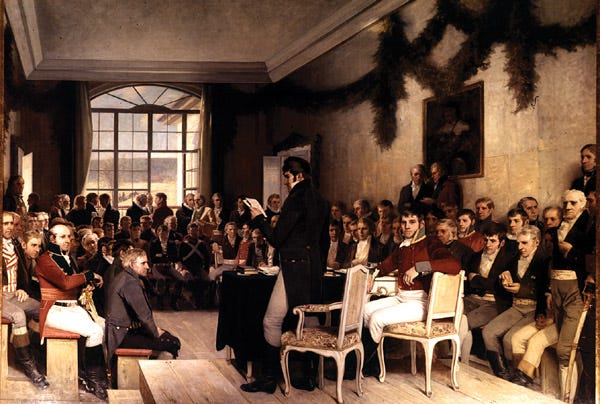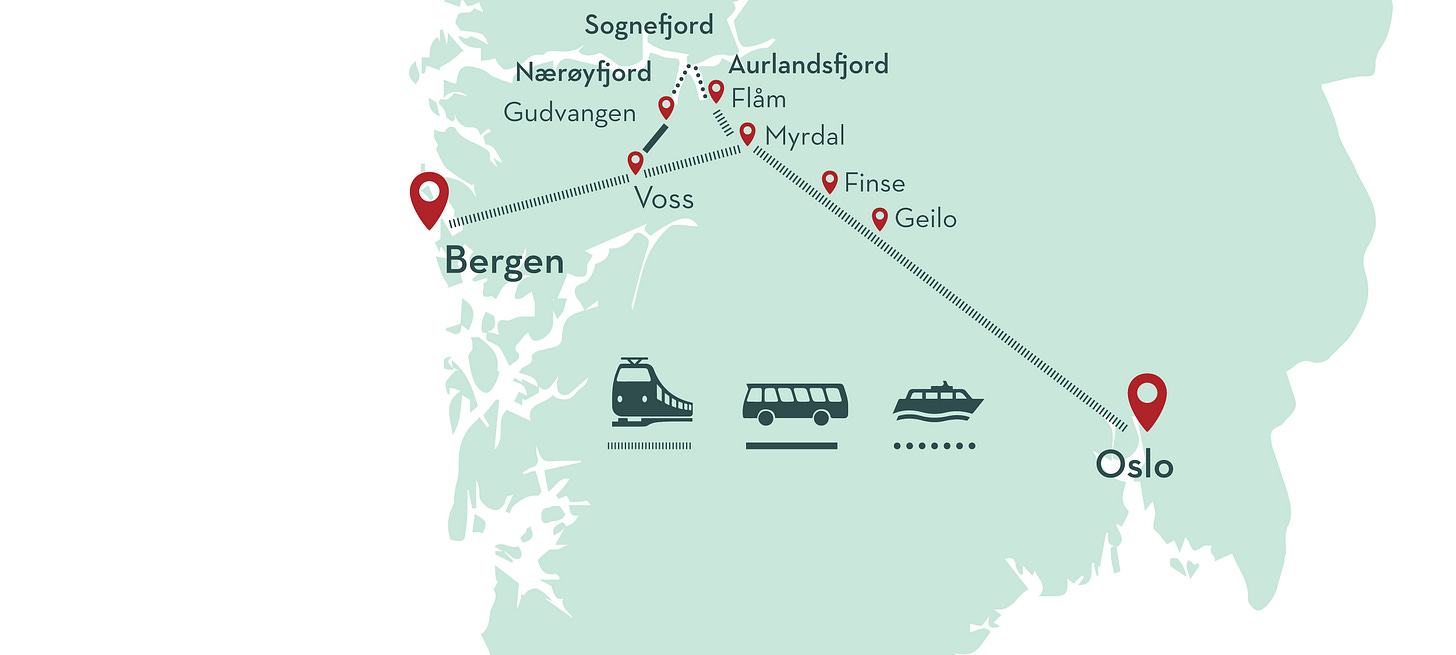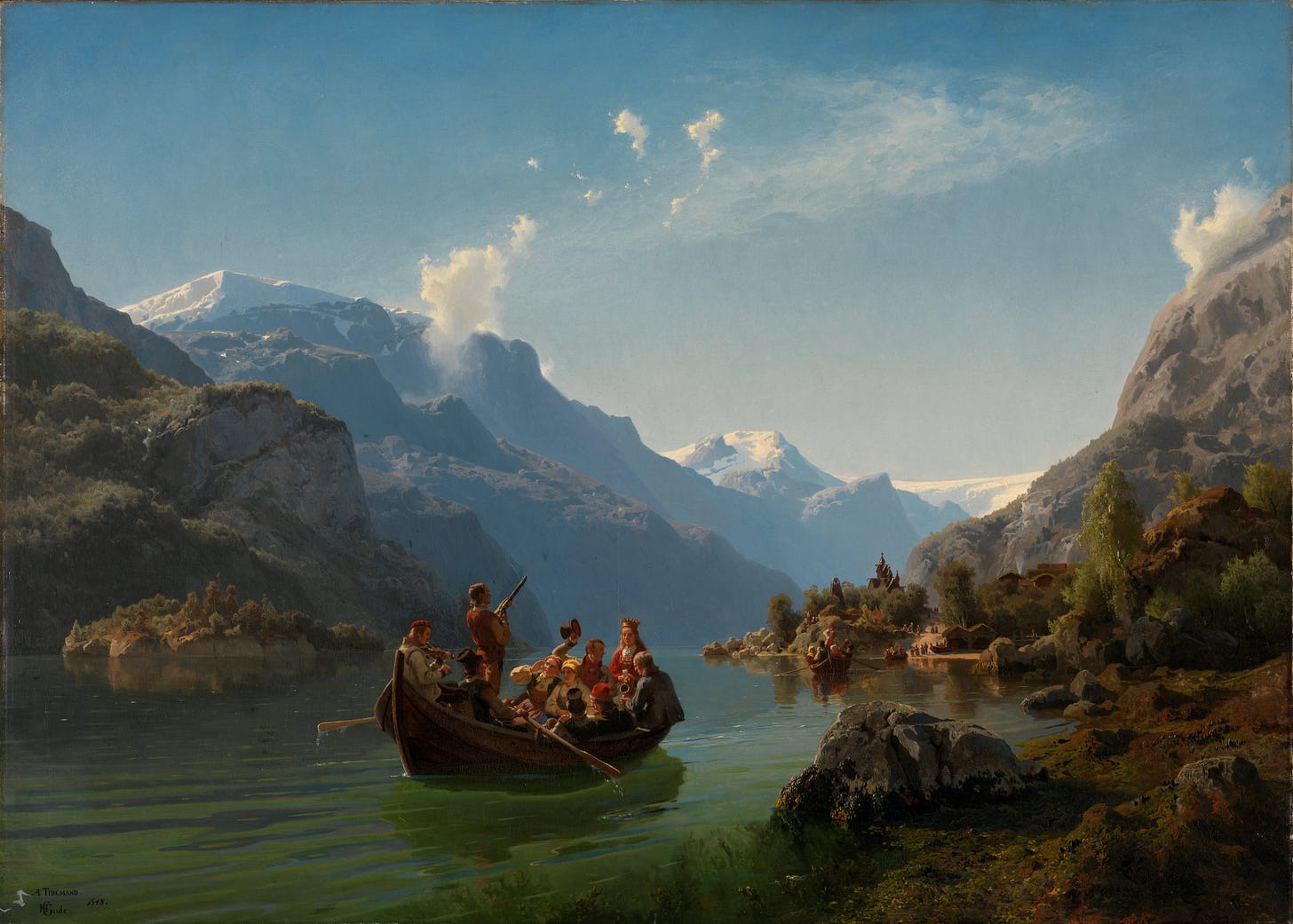Norway in a Nutshell
And the struggle to define what being Norwegian means
I: Planning a vacation to your former home
Last weekend my fiancé and I finished booking travel and lodge for a trip we’ve been postponing since 2020… a trip to Norway 🇳🇴
I haven’t been back since 2004, which is 18 years ago.
I was 18 when I left. Huh.
It’s strange to realize, as I’m typing this, that I’ve spent equally as much time being alive growing up in Norway as I have spent living outside of Norway.
There are so many things I’d love to do during our two-week trip there. Oslo has changed a lot since I last left: a new opera and modern art museum on the harbourfront, new subway lines got built, and lots of new office and residential development everywhere. We want to do some epic hikes around the country while we still have the strength and stamina to do so. I also want to take Michael to the spots of some of my most cherished childhood memories.
However, there is one thing I insist we make room for, and that I encourage everyone who visits Norway to do because it’s so easy to book and you get so much out of it.
This is the “Norway in a Nutshell” train ride from Oslo to Bergen.
It is one of those quintessential experiences that manages to encapsulate a diverse Norwegian landscape experience in a compact 16h trip (24h if doing a roundtrip). You get to see a geo-historic cross-section of the country that is elegantly strung together as a seamless multimodal journey. Trains through mountains, boats through fjords, buses through winding roads… oh my!
The trip is a classic, and has remained unchanged for as long as I have been aware. Heck, it’s so good, it’ll be my third time taking this trip. Let’s go!
II: Reconnecting to parallel narratives of fellow countrymen
Also over the weekend, I met Stian Håklev, a Twitter-friend who is a fellow Norwegian and PKM nerd, and who also happened to be in Toronto. It had been a while since I last was in Norway (18 years remember?) so my Norwegian was terribly rusty… and my mental image of the national discourse around identity was equally outdated.
It turns out, there are a bunch of people who, like me, were children of immigrant parents, who grew up in a Norwegian environment, and who now are adults chatting about what it means to be Norwegian. (I have personally explored this topic in writing here and here as well, and… it’s still complicated for me.)
Stian recommended I listen to this podcast episode (it’s in Norwegian) where three Norwegian journalists, born in Norway and of visual minorities were debating what it means to be Norwegian. Basically, this is what happened:
Journalist 1, Fawad Ashraf, wrote a piece which is what kicked off the whole national convo which led to this debate, wherein he states that he is giving up trying to call himself Norwegian. He finds the definition too narrow, the target is always moving, and ongoing discrimination (often passive-aggressive comments) just makes him tired. Instead of trying to fulfill the criteria for this ambiguous label, he is choosing to not live by other people’s expectations and instead has chosen to reject the label “Norwegian” altogether—and he has found it very liberating. He’s still a citizen and will pay taxes and do all that jazz, but is declining on using “Norwegian” as a label to describe himself.
Journalist 2, Shazia Majid, sympathies with Fawad as they’ve experienced very similar things. However, she goes the total opposite direction and calls herself just plain “Norwegian”. Her goal is, by demonstration, to expand the definitions of what it means to be Norwegian by staunchly declaring it without dilution (e.g. Norwegian-Pakistani). When people see her calling herself Norwegian, others who don’t have the stereotypical caucasian look can be inspired to do the same. She’s not just about “taking up space” as North Americans often like to say, but she wants to make the room bigger.
Journalist 3, Xueqi Pang, interestingly says she puts herself somewhere in the middle, but more towards Fawad. She no longer feels the importance of trying to convince others of her Norwegianness, because she doesn’t see being Norwegian as some sort of special title over being something else like Chinese. She can be any title, or none of the titles, and this non-attachment to nation-level identity has helped her relax more than anything into simply being herself.
In conclusion, the debate was closed with Xueqi basically saying (and I heavily paraphrase): the three of us might have very different ways of tackling this. But by having this debate and showing the listener the true, unpolished diversity of experience and different ways of tackling this subject, we are sharing information, knowledge and journalism on the matter and allowing the listener to make up their own mind about what they think about all of this. One thing we all agree on is that we all want openness and freedom to choose our own way. This is an incredibly positive direction.
Wow, what a beautiful and eloquent message. And so uniquely Norwegian to say something like this as well. Let us embrace diversity in its full form and complexity, and not simplify it for the sake of marketing and the soundbyte.
Indeed, some things just cannot and shouldn’t be further reduced.
(Meta, but I think that a strong journalistic standard is very Norwegian. After all, Norwegian journalism is rated the strongest in the world.)
III: My thoughts on Norwegian-ness
On being Norwegian abroad
It is an interesting experience to be a Norwegian abroad. I feel I have been allowed to be more of an ambassador for Norwegian values and culture than if I had stayed in Norway where the focus would have been on “how Norwegian are you really”.
Is there something called reverse-racism or negative-racism? Where people don’t single you out because you’re strange and foreign, but because they’re genuinely curious about your culture, and they want to interact with you as a result? This particular instance can of course also be labeled “privilege” lol but i’m trying to find better words for this because despite the obvious preference (people are generally fascinated by Norway, another white culture) there is something I’ve benefited from here as a Norwegian who doesn’t “look” like one. Maybe it’s just the absence of racism, idk
On what makes me feel Norwegian-ness
For some truly sentimental Norwegian-ness to stir up in me, all you need to do is to play some tunes that traditionally would be played during May 17, our national day. I’ll tell you why.
A couple of things were happening about 200 years ago:
It’s complicated, but after hundreds of years of being under Danish rule, and then being given to the Swedes as spoils from the Napoleon War, Norway was kinda tired of being this ping pong ball. Through some sort of administrative error, there was a brief period of time between the handover from Denmark to Sweden where Norway actually was independent as a nation. During this window in 1814, a bunch of important guys hurriedly put together a constitution and got one step closer towards independence, to the dismay of the Swedish king Karl Johan who put a stop to this immediately.

But something stirred in the national heart. A faint whisper of a national soul which had been repressed for so long. After being under Danish and Swedish rule for so long, people in Norway started asking: Who are we anymore? What are we to be proud of that isn’t Danish or Swedish? What could life as a Norwegian be where we are independent?
Simultaneously, a new historic period originating in Germany would spread throughout the western world and instigate a bloom of art and culture called national romanticism. The drive behind this movement was a self-enforcing cultural inquiry founded on beauty, nature, cultural longing and sovereignty, which was quite a different vibe from the science and rationality-dominated centuries before this. (In Canada for instance, a form of national romanticism expressed itself in the art of the Group of Seven.)
For instance, take this masterpiece below:
It shows a wedding procession by boat, set in a fjord. The painting depicts dignified representation of being a Norwegian farmer at the time. It glorifies the common experience, local folklore and tradition and true, undiluted cultural and geographic characteristics.
Let me try to describe how special it is that this was painted in 1848, and I’ll be digging deep into my art history lessons from high school: Before this, Norway was a bit of a backward and poor country, with not much going for it. Fjords and mountains were perceived as hostile and rough wilderness, which had no place in fine arts motifs just 100 years before. Farmers were being ridiculed in paintings elsewhere in Europe.
National romanticism gave Norwegians permission to love their people as they were. To display their diverse traditions without simplification, generalization and ridicule. To feel proud of their rocky, barren, and oh-so-dramatic landscapes. Painting this was revolutionary. It is why a trip like “Norway in a Nutshell” can even exist.
Not surprisingly, most if not all of the tunes (link in Norwegian) that are played and sung on May 17 come from this very specific time in Norwegian history (around the 1800s) and later. Whenever they are being sung, it summons this timeless love and pride for the country. Being able to tap into and hold space for this old nationalistic sentiment whenever those songs are played is something that makes me feel very Norwegian, regardless of what others say: Because I can totally relate to this.
The struggle of second-generation Norwegians born to immigrant parents is similar. Like Norway in the 1800s, we are tired of being put on second row. We want to be accepted as equal, independent and actively participating members of Norwegian society. And it is happening. One day, perhaps someone will paint a painting that depicts the modern day Norwegian: where we are in it, and where we are embraced for who we are alongside all that it means to be Norwegian. And it must be in this romanticized way :) One can dream, right?
Coming full circle, Norway is and will always remain my first home and nationality. I cannot deny it, and people can try to pry it away from me, but at the end of the day it’s just part of me and my personal history. As the three Norwegian journalists showed, there are many ways to reconcile this fact into our personal identities, and that is a lovely thing. It is a big feat to leave plurality alone, in a world where consolidation and simplification is constantly encouraged (and shown to be a model of “successful” within the boundaries of colonialism and capitalism). Writing about this struggle is cathartic, and also clarifying. By putting this out there, I hope it can help someone else in their journey towards reconciling their multi-cultural identity as well.
Thanks for reading all the way! I’d love to hear your relationship with your nationality and culture(s). Please share in the comments below, or in a reply.
Give this letter a ❤️ if you enjoyed it (and do share the letter with friends who may appreciate it too!)
Until next time, stay safe and stay curious.
—Fei🪢



This newsletter was packed with so much brilliant content I hardly know how to respond. Re: culture – I look Eastern European (and partially am) or Nordic, though I'm actually Hispanic. No one knows this. I don't talk about it because I don't look the part and wasn't brought up with Argentina (where my mother was born) as part of my cultural heritage. But it's still part of me. And it's a confusing part. Also, as a Jew who has been intensely secular and non-affiliated all my life until recently, I have to say: I can abandon the religion or even convert, but I would still always be Jewish – it's in my genes, in my very fabric. So recently I've decided to embrace that genetic code and having a meaningful experience doing so. Your writing helped deepen my thoughts on the topic!
Thanks for sharing your idnetity. I was born in Indonesia. But didn't know I was Indonesian when I grew up in the States. At 7, we packed up (dad had finished his PhD) and got on a plane. Suddenly found myself going to school and not understanding a word anybody was saying, with kids staring at me. I asked my parents "when are we going home?" They said "we ARE home." Oh well! Might as well start learning the language then (if only to tell the pesky girl next door that I hate her…LOL). I still consider myself Indonesian, even when I've lived here in New Zealand longer than I have anywhere else. But weirdly, I feel more of a migrant when I'm in Indonesia, than when I'm in NZ.